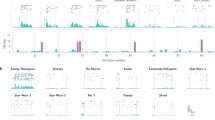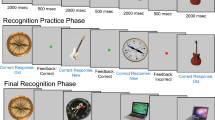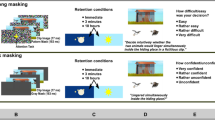Abstract
Human actions require integration of past experiences, ongoing percepts and future concepts. To adapt behavior to reality, the brain must identify mental representations of current relevance. Occasional amnesic subjects act according to invented stories ('spontaneous confabulations'), disregarding present reality. We used repeated runs of a continuous recognition task to measure the ability to distinguish currently relevant from previously encountered but currently irrelevant information. Spontaneous confabulators detected target items as accurately as nonconfabulating amnesics, but increasingly failed to suppress false-positive responses, confusing presentation in previous runs with presentation in the current run. Lesions involved the anterior limbic system: medial orbitofrontal cortex, basal forebrain, amygdala and perirhinal cortex or medial hypothalamus. We suggest that the anterior limbic system represents 'now' in human thinking by suppressing currently irrelevant mental associations.
This is a preview of subscription content, access via your institution
Access options
Subscribe to this journal
Receive 12 print issues and online access
$209.00 per year
only $17.42 per issue
Buy this article
- Purchase on Springer Link
- Instant access to full article PDF
Prices may be subject to local taxes which are calculated during checkout



Similar content being viewed by others
References
Fuster, J. M. Memory in the Cerebral Cortex(MIT Press, Cambridge, Massachusetts, 1995).
Damasio, A. R. Time-locked multiregional retroactivation: A systems-level proposal for the neural substrates of recall and recognition. Cognition 33, 25–62 (1989).
Kinsbourne, M. in The Cognitive Neurosciences 1321–1329 (MIT Press, Cambridge, Massachusetts,1995).
Schnider, A., von Däniken, C. & Gutbrod, K. The mechanisms of spontaneous and provoked confabulations. Brain 119, 1365–1375 (1996).
Schnider, A., Gutbrod, K., Hess, C. W. & Schroth, G. Memory without context. Amnesia with confabulations following right capsular genu infarction. J. Neurol. Neurosurg. Psychiatry 61, 186 –193 (1996).
Berlyne, N. Confabulation. Br. J. Psychiatry 120, 31 –39 (1972).
Kopelman, M. D. Two types of confabulation. J. Neurol. Neurosurg. Psychiatry 50, 1482–487 (1987).
Schnider, A., von Däniken, C. & Gutbrod, K. Disorientation in amnesia: A confusion of memory traces. Brain 119, 1627–1632 (1996).
DeLuca, J. & Cicerone, K. D. Confabulation following aneurysm of the anterior communicating artery. Cortex 27, 417–423 (1991).
Schnider, A., Ptak, R. & Gutbrod, K. Long-term follow-up of spontaneous confabulators: recovery of temporal context memory. J. Int. Neuropsychol. Soc. 4, 61 (1997).
Scoville, W. B. & Milner, B. Loss of recent memory after bilateral hippocampal lesions. J. Neurol. Neurosurg. Psychiatry 20, 11–21 ( 1957).
Schnider, A., Regard, M. & Landis, T. Anterograde and retrograde amnesia following bitemporal infarction. Behav. Neurol. 7, 87– 92 (1994).
Dalla Barba, G. Different patterns of confabulation. Cortex 29, 567–581 (1993).
Moscovitch, M. & Melo, B. Strategic retrieval and the frontal lobes: evidence from confabulation and amnesia. Neuropsychologia 35, 1017–1034 (1997).
Kopelman, M. D., Hg, N. & Van den Brouke, O. Confabulation extending over episodic, personal, and general semantic memory. Cogn. Neuropsychol. 14, 683–712 (1997).
Dalla Barba, G. Confabulation: knowledge and recollective experience. Cogn. Neuropsychol. 10, 1–20 (1993 ).
Hanley, J. R., Davies, A. D., Downes, J. J. & Mayes, A. R. Impaired recall of verbal material following rupture and repair of an anterior communicating artery aneurysm. Cogn. Neuropsychol. 11, 543–578 (1994).
Mercer, B., Wapner, W., Gardner, H. & Benson, D. F. A study of confabulation. Arch. Neurol. 34, 429– 433 (1977).
Benson, D. F. et al. Neural basis of confabulation. Neurology 46, 1239–1243 (1996).
Shapiro, B. E., Alexander, M. P., Gardner, H. & Mercer, B. Mechanisms of confabulation. Neurology 31, 1070–1076 (1981).
Moscovitch, M. in Varieties of Memory and Consciousness. Essays in the Honour of Endel Tulving (eds. Roediger, H. L. & Craik, F. I.) 133– 160 (Erlbaum, Hillsdale, New Jersey, 1989).
Johnson, M. K. in Awareness of Deficit After Brain Injury. Clinical and Theoretical Issues (eds. Prigatano, G. P. & Schacter, D. L.) 176- 197 (Oxford Univ. Press, New York, 1991).
Burgess, P. W. & Shallice, T. Confabulation and the control of recollection. Memory 4, 359–411 (1996).
Schacter, D. L., Norman, K. A. & Koutstaal, W. The cognitive neuroscience of constructive memory. Annu. Rev. Psychol. 49, 289–318 (1998).
Stuss, D. T., Alexander, M. P., Lieberman, A. & Levine, H. An extraordinary form of confabulation. Neurology 28 , 1166–1172 (1978).
Fischer, R. S., Alexander, M. P., D'Esposito, M. & Otto, R. Neuropsychological and neuroanatomical correlates of confabulation. J. Clin. Exp. Neuropsychol. 17, 20– 28 (1995).
Cunningham, J. M., Pliskin, N. H., Cassisi, J. E., Tsang, B. & Rao, S. M. Relationship between confabulation and measures of memory and executive function. J. Clin. Exp. Neuropsychol. 19, 867–877 ( 1997).
Kapur, N. & Coughlan, A. K. Confabulation and frontal lobe dysfunction. J. Neurol. Neurosurg. Psychiatry 43, 461–463 (1980).
Johnson, M. K., O'Connor, M. & Cantor, J. Confabulation, memory deficits, and frontal dysfunction. Brain Cogn. 34, 189–206 (1997).
Hirst, W. & Volpe, B. T. Temporal order judgments with amnesia. Brain Cogn. 1, 294–306 (1982).
Huppert, F. A. & Piercy, M. Recognition memory in amnesic patients: effect of temporal context and familiarity of material. Cortex 12, 3–20 (1976).
Schacter, D. L., Harbluk, J. L. & McLachlan, D. R. Retrieval without recollection: an experimental analysis of source amnesia. J. Verbal Learn. Verbal Behav. 23 , 593–611 (1984).
Squire, L. R., Nadel, L. & Slater, P. C. Anterograde amnesia and memory for temporal order. Neuropsychologia 19, 141–145 (1981).
Parkin, A. J. & Hunkin, N. M. Impaired temporal context memory on anterograde but not retrograde tests in the absence of frontal pathology. Cortex 29, 267–280 (1993).
Kopelman, M. D., Stanhope, N. & Kingsley, D. Temporal and spatial context memory in patients with focal frontal, temporal lobe, and diencephalic lesions. Neuropsychologia 35, 1533–1545 ( 1997).
Bowers, D., Verfallie, M., Valenstein, E. & Heilman, K. M. Impaired acquisition of temporal information in retrosplenial amnesia. Brain Cogn. 8, 47–66 ( 1988).
Janowsky, J. S., Shimamura, A. P. & Squire, L. R. Source memory impairment in patients with frontal lobe lesions. Neuropsychologia 27, 1043– 1056 (1989).
Shimamura, A. P. & Squire, L. R. The relationship between fact and source memory: findings from amnesic patients and normal subjects. Psychobiology 19, 1– 10 (1991).
Milner, B., Corsi, P. & Leonard, G. Frontal-lobe contribution to recency judgements. Neuropsychologia 29, 601–618 (1991).
Kesner, R. P., Hopkins, R. O. & Fineman, B. Item and order dissociation in humans with prefrontal damage. Neuropsychologia 32, 881– 889 (1994).
Squire, L. R. & Shimamura, A. P. Characterizing amnesic patients for neurobehavioral study. Behav. Neurosci. 100, 866–877 (1986).
Jones, B. & Mishkin, M. Limbic lesions and the problem of stimulus-reinforcement associations. Exp. Neurol. 36 , 362–377 (1972).
Meunier, M., Bachevalier, J. & Mishkin, M. Effects of orbital frontal and anterior cingulate lesions on object and spatial memory in rhesus monkeys. Neuropsychologia 35, 999–1015 ( 1997).
Delis, D. C., Kramer, J. H., Kaplan, E. & Ober, B. A. The California Verbal Learning Test(Psychological Corp., New York, 1987).
Thurstone, L. L. & Thurstone, T. G. Chicago Test of Primary Mental Abilities(Research Associates, Chicago, 1963).
Regard, M., Strauss, E. & Knapp, P. Children's production on verbal and non verbal fluency tasks. Percept. Motor Skills 55, 839– 844 (1982).
Perret, E. The left frontal lobe of man and the suppression of habitual responses in verbal categorical behavior. Neuropsychologia 12, 323–330 (1974).
Snodgrass, J. G. & Vanderwart, M. A standardized set of 260 pictures: norms for name agreement, image agreement, familiarity, and visual complexity. J. Exp. Psychol. Hum. Learn. 6, 174–215 (1980).
Damasio, H. & Damasio, A. R. Lesion Analysis in Neuropsychology (Oxford Univ. Press, New York, 1989).
Acknowledgements
We thank C. von Däniken for testing some of the patients and C.W. Hess, T. Landis, K. Gutbrod and E. Markus for helpful comments. Study supported by grant no. 32-50882.97 of the Swiss National Science Foundation.
Author information
Authors and Affiliations
Corresponding author
Rights and permissions
About this article
Cite this article
Schnider, A., Ptak, R. Spontaneous confabulators fail to suppress currently irrelevant memory traces. Nat Neurosci 2, 677–681 (1999). https://doi.org/10.1038/10236
Received:
Accepted:
Issue Date:
DOI: https://doi.org/10.1038/10236
This article is cited by
-
Flexible adjustment of anticipations in human outcome processing
Scientific Reports (2022)
-
A Neuropsychological Approach to Auditory Verbal Hallucinations and Thought Insertion - Grounded in Normal Voice Perception
Review of Philosophy and Psychology (2016)
-
Abnormal Cortical Network Activation in Human Amnesia: A High-resolution Evoked Potential Study
Brain Topography (2010)
-
Peduncular hallucinosis
Journal of Neurology (2006)
-
The human orbitofrontal cortex: linking reward to hedonic experience
Nature Reviews Neuroscience (2005)



